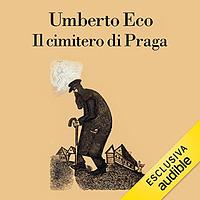You need to sign in or sign up before continuing.
Take a photo of a barcode or cover
I love Eco, both fiction and non. But I think in this particular book only some of all the wonderful juiciness inside his head actually made it onto the page.
Das Buch ist sehr lesenswert. Es hat eine gewisse Spannung in sich, aber anders natürlich als in Fantasy- oder Abenteuerromanen. Was mich allerdings unglaublich gestört hat, war die deutsche Übersetzung (der schiebe ich das jetzt in die Schuhe): Bei Namen wurde immer der Artikel vorangestellt, also zum Beispiel "mir wurde von der Carmen / von dem Hebuterne erzählt...". Das hat mich unglaublich gestört
I received a review copy from the publisher. Even free, I was really disappointed with this one. I have read most of Eco's novels and have always enjoyed them, but this one just didn't seem up to par. In fact I don't recall ever opening one of his books halfway through and thinking "ugh, how much longer?."
There was no real mystery, nothing but time driving the action forward. Eco's other works sometimes start slowly, but usually end well, so I will invest the time to finish them. Sadly, I was only pleased that it ended...
There was no real mystery, nothing but time driving the action forward. Eco's other works sometimes start slowly, but usually end well, so I will invest the time to finish them. Sadly, I was only pleased that it ended...
challenging
mysterious
reflective
fast-paced
Plot or Character Driven:
A mix
Loveable characters:
No
Quelques longueurs sinon ça aurait été un 5 ⭐️. Très intéressant pour ceux qui seraient tentés d’en apprendre plus sur la montée de l’antisémitisme en Europe au 19eme siècle.
While I appreciate the quality of Eco's language skills and the importance of the subject of his book, I could only give this 2 stars because I simply didn't like it. Mainly because of the horrific hatred I had to wade through. I realise that this was the point, and as such the novel was successful, but I cannot say that I enjoyed this experience. This book was intentionally nasty (and rightly so), leaving me with the feeling that I want to wash it out of my brain. I struggled to keep going with it, but felt that I had a duty to finish it. Should people read this book to help their understanding of the upsurge in anti-semitism during the later half of the C19th? Yes. Is it important to understand how such a disgusting thing as The Protocols of Zion could come about and influence others? Yes. Did I like the book? No. Would I read it again? Absolutely not.
Quite simply the worst book of Eco's career, a career I am now seeing as vastly overrated and pretentiously academic, with no feeling for humanity (he is, after all, a devout Zionist).
Oh, my God, this book made my brain hurt! Actually, reading any Umberto Eco book makes my brain hurt. Even The Name of the Rose, which I loved, and Foucault's Pendulum, which I liked, gave me pains when I was reading them. I think the problem may be that Eco is so far beyond me intellectually that I have to struggle to keep up with him. Even so, I probably miss a lot of his references. Somewhat paradoxically though, I do enjoy reading him. I enjoy the challenge.
This book is the fictionalization of the creation of an actual work of fiction, the notorious The Protocols of the Elders of Zion. This is the anti-Semitic screed that had its origin in the 19th century, being based on what was apparently intended as a political satire. In the hands of those who hated Jews and who sought justification for oppressing and ultimately eliminating them, it became the excuse for the instigation of extreme evil.
Eco takes us into the middle and late 19th century in Italy, France, and Prussia. It was a revolutionary time, a time of extreme political upheaval when Italy was on its way to being unified and the Paris Commune was attempting reform in France. Moreover, it was a time of religious conflict and of the prominence of belief in the occult and of the rise of Freemasonry, as well as celebration of Black Masses. This was a heady mixture which resulted in plots and counter-plots. Eco imagines that behind it all is one man, one evil genius, Simone Simonini.
Simonini is a master counterfeiter who produces all kinds of fake documents which keep the political pot boiling, including the document which convicts the Jewish Captain Dreyfus in France and lands him on Devil's Island. It is Simonini who, at the behest of the Russian secret service, produces The Protocols of the Elders of Zion. The document purports to be the minutes of a meeting of rabbis in the Prague Cemetery, in which they discuss their plans for world domination. Not only was this document accepted and believed by many in the 19th century, it continued to be published as fact(!) throughout the 20th century and was actually cited by Hitler as justification for the Holocaust. Henry Ford - yes, that Henry Ford! - was also a big fan. Sadly, it is still being published - and believed - by people today.
There is an extensive cast of characters here, who are sometimes difficult to keep straight. Interestingly, they, except for Simonini, are mostly all actual historical characters and, Eco assures us, they spoke and behaved in the way that he reports. I'm not enough of a historian to judge whether that is really true, but it does give this story an extra fillip of authenticity.
This was a difficult read, but I'm glad I read it - emphasis on the past tense. It does have some relevance, I think, for today's world beyond that unfortunate zombie document, The Protocols, which just refuses to die. It reveals to us how easily humans can be manipulated by the unscrupulous who are willing to concoct and repeat lies that appeal to people's basest instincts - and keep telling them over and over and over again until they become a part of the public canon. God, what fools these mortals be!
This book is the fictionalization of the creation of an actual work of fiction, the notorious The Protocols of the Elders of Zion. This is the anti-Semitic screed that had its origin in the 19th century, being based on what was apparently intended as a political satire. In the hands of those who hated Jews and who sought justification for oppressing and ultimately eliminating them, it became the excuse for the instigation of extreme evil.
Eco takes us into the middle and late 19th century in Italy, France, and Prussia. It was a revolutionary time, a time of extreme political upheaval when Italy was on its way to being unified and the Paris Commune was attempting reform in France. Moreover, it was a time of religious conflict and of the prominence of belief in the occult and of the rise of Freemasonry, as well as celebration of Black Masses. This was a heady mixture which resulted in plots and counter-plots. Eco imagines that behind it all is one man, one evil genius, Simone Simonini.
Simonini is a master counterfeiter who produces all kinds of fake documents which keep the political pot boiling, including the document which convicts the Jewish Captain Dreyfus in France and lands him on Devil's Island. It is Simonini who, at the behest of the Russian secret service, produces The Protocols of the Elders of Zion. The document purports to be the minutes of a meeting of rabbis in the Prague Cemetery, in which they discuss their plans for world domination. Not only was this document accepted and believed by many in the 19th century, it continued to be published as fact(!) throughout the 20th century and was actually cited by Hitler as justification for the Holocaust. Henry Ford - yes, that Henry Ford! - was also a big fan. Sadly, it is still being published - and believed - by people today.
There is an extensive cast of characters here, who are sometimes difficult to keep straight. Interestingly, they, except for Simonini, are mostly all actual historical characters and, Eco assures us, they spoke and behaved in the way that he reports. I'm not enough of a historian to judge whether that is really true, but it does give this story an extra fillip of authenticity.
This was a difficult read, but I'm glad I read it - emphasis on the past tense. It does have some relevance, I think, for today's world beyond that unfortunate zombie document, The Protocols, which just refuses to die. It reveals to us how easily humans can be manipulated by the unscrupulous who are willing to concoct and repeat lies that appeal to people's basest instincts - and keep telling them over and over and over again until they become a part of the public canon. God, what fools these mortals be!



